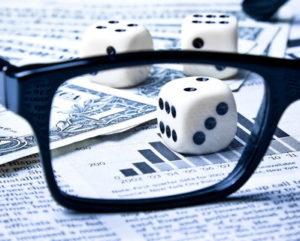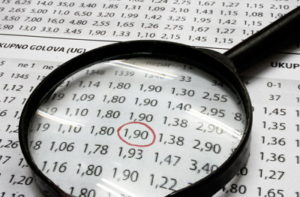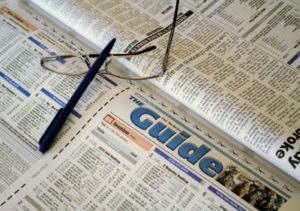 An Odds Trader, also sometimes referred to as an Odds Compiler, is someone that is employed by a bookmaker or a betting company in order to decide what odds should be given to events that people can bet on. They price the markets and get involved with many different aspects of the world of gambling, including the monitoring of customer accounts and the profitability of the operation that they work for.
An Odds Trader, also sometimes referred to as an Odds Compiler, is someone that is employed by a bookmaker or a betting company in order to decide what odds should be given to events that people can bet on. They price the markets and get involved with many different aspects of the world of gambling, including the monitoring of customer accounts and the profitability of the operation that they work for.
With that in mind, an obvious question for some might be whether it is allowed for the people that come up with the odds to then bet on events themselves. The answer is ‘yes’, though it’s common for them to have to do so with companies other than the ones that they work for. Indeed, many Odds Traders make more money from betting on events than they do from the work of compiling the odds for other bettors.
Odds Trading Explained
 Odds Traders are responsible for coming up with the odds on markets that people want to bet on. They do this by using as much information as they can find, analysing that information and making decisions accordingly. Unsurprisingly, given the huge variation in the sports world, some of the markets that they decide the odds on are hugely statistical, whilst others require them to use their insight and intuition.
Odds Traders are responsible for coming up with the odds on markets that people want to bet on. They do this by using as much information as they can find, analysing that information and making decisions accordingly. Unsurprisingly, given the huge variation in the sports world, some of the markets that they decide the odds on are hugely statistical, whilst others require them to use their insight and intuition.
Odds are not a static market, either. The position that an Odds Trader comes up with might well need to shift and adjust depending on the financial position that the bookmaker they work for finds themselves in. Their knowledge can be invaluable to a bookie, especially if someone wants to place a large wager and the bookmaker isn’t sure whether to accept it or not. They want to ensure that they’re not in a position where they’re accepting high liabilities.
Odds Traders don’t decide the odds on their own, with the rest of the bookmaking market being taken into account as well. If they get their odds wrong compared to the market as a whole then they can put themselves at risk of arbitrage bettors, who take advantage of discrepancies in the market in order to make a guaranteed profit. Odds are also influenced by the volume of bets placed on a specific event.
What Skills An Odds Trader Needs
 Whilst it might seem like a fun job to be an Odds Trader, it’s not something that just anybody can do. For starters, you have to be good at mathematics if you’re going to even attempt to become one. You’ll need to work out odds and percentages, figuring out why one set of odds make more sense than others. You’ll also have to have a degree of interest in the market that you want to work in, which can differ from market to market.
Whilst it might seem like a fun job to be an Odds Trader, it’s not something that just anybody can do. For starters, you have to be good at mathematics if you’re going to even attempt to become one. You’ll need to work out odds and percentages, figuring out why one set of odds make more sense than others. You’ll also have to have a degree of interest in the market that you want to work in, which can differ from market to market.
Someone that wishes to be an Odds Trader for popular culture, for example, will need a different set of skills to someone that wants to work in horse racing or football. Figuring out who is most likely to win an Oscar or become the James Bond is, after all, decidedly different to working out which horse is most likely to win the Grand National or wish football club has the best chance of becoming Premier League champions.
Odds Traders need to bid goodbye to a typical social life, given that they’ll need to constantly monitor the markets given the fact that odds can change minute-to-minute. Most Odds Traders will constantly watch the sport or market that they work in, reading the papers first thing in the morning and checking how many bets have been placed and whether odds need to be adjusted accordingly. Whilst it can be a 9am to 6pm job, it will also involve hours outside that.
It’s Not All Done By Humans
 Of course, in the day and age of computers being as important in the world of betting as they are in monitoring the stock market, it’s fair to say not every decision is left up to humans. Aside from anything else, just are just too many markets and too much depth for a human to make all of the decisions every step of the way. Think of the ever-shifting world of In-Play betting and you’ll understand why computers are needed.
Of course, in the day and age of computers being as important in the world of betting as they are in monitoring the stock market, it’s fair to say not every decision is left up to humans. Aside from anything else, just are just too many markets and too much depth for a human to make all of the decisions every step of the way. Think of the ever-shifting world of In-Play betting and you’ll understand why computers are needed.
What this does mean, though, is that the likes of risky bets can have attention to them by algorithms as much as by the Odds Traders. Something will flash up on a computer somewhere and one of the Odds Traders will take a look to see whether it’s something that they need to be concerned about or not. Computers will monitor the profit or loss that a bookmaker stands to be on the end of depending on how the various different events pan out.
Is It Fair That They Can Bet?
 Knowing what an Odds Trader does, it’s not unreasonable to question whether or not they should actually be allowed to place bets themselves. After all, the very nature of the job means that they will have more information about the odds being given to a market than the average bettor. It’s also the case that Odds Traders are obsessed with sports, so they’ll have far more knowledge of the issue than the typical punter placing wagers.
Knowing what an Odds Trader does, it’s not unreasonable to question whether or not they should actually be allowed to place bets themselves. After all, the very nature of the job means that they will have more information about the odds being given to a market than the average bettor. It’s also the case that Odds Traders are obsessed with sports, so they’ll have far more knowledge of the issue than the typical punter placing wagers.
Of course, Odds Traders taking on the bookmakers is something of a victimless crime, given that all they’re doing is going up against the sorts of companies that they work for and that can afford to lose the money. When it comes to betting on the exchanges, however, things become slightly different. If you’re looking to bet with an exchange company then you’re taking on other punters, which means that your advantage will start to count for something.
Even so, to do so is not illegal. Someone that bets on an exchange isn’t doing anything against the law and is simply using their knowledge and experience to give themselves an increased chance of winning. It is far more of a moral problem than a legal one, with the people involved having to decide for themselves whether their skills are giving them such an unfair advantage that they shouldn’t use them for extra profit on top of their wage.
Odds Traders work hand-in-glove with Compilers, with the pair sharing similar roles. Whilst much of the betting world has been computerised, the likes of the supremacy of one side over the other and the expectancy of a given result still largely comes down to intuition and experience. That is something that an Odds Trader has in their arsenal that can be employed against a bookie that an average punter simply doesn’t have.
Odds Traders will also know far more about a bookmaker’s margin, which normally stands at around 4%. They will stand more chance of knowing when it’s in their favour to place a wager than an average bettor would, thereby giving themselves a slight edge. Again, this is only a problem when they’re betting on the exchange, whilst using it against a fixed odds bookmaker is simply levelling the playing field.
